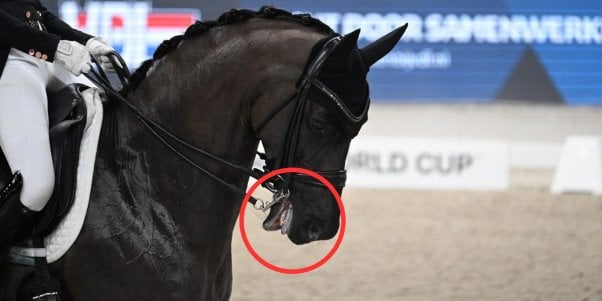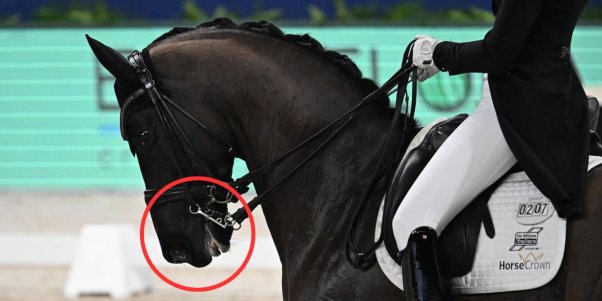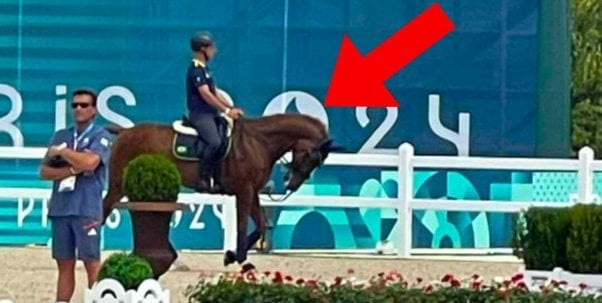Vicious Whipping, Bloody Horses, and Blue Tongues—Olympic Equestrian Events Must End!
Update (August 14, 2024): Vicious whipping, bloody horses, and blue tongues—the scandals uncovered during the Paris 2024 Summer Olympics equestrian events cast a dark shadow over the Games. These cruel incidents will continue to occur until the International Olympic Committee (IOC) bans equestrian events altogether—which is why PETA entities around the globe are mobilizing for action.
The cruelty that hit headlines during this year’s Olympic equestrian events isn’t new, as PETA entities pointed out in a letter to the IOC:
Colombian-American Olympic coach and former rider Cesar Parra was caught on video whipping one horse and tying down the head of another. Swiss Olympian Martin Fuchs whipped a clearly terrified horse who didn’t want to jump a fence. Canadian Eric Lamaze’s horse dropped dead during a stadium jumping event. German Olympian Ludger Beerbaum was caught “barring” a horse. New Zealand Olympian Sir Mark Todd repeatedly beat a reluctant horse with a thick tree branch. A video reported to be of Danish Olympian Carina Cassøe Krüth whipping a horse while training under bronze medal winner Andreas Helgstrand in 2022 has just surfaced. The abuse is entrenched, and all efforts to eradicate it have failed.”
Horses don’t choose to compete in the Olympics—humans force them to do so through violence and coercion. Equestrian events can’t be fixed by better oversight or stronger rules. The only way to protect horses from this widespread cruelty is to get rid of these “sports” altogether. There is already a precedent: The horse-jumping portion of the modern pentathlon is being eliminated, beginning with the 2028 Olympics, following pressure from PETA and a public outcry over the whipping and punching of a frightened horse during the 2020 Games, which were held in 2021.
Join PETA and the more than 82,000 compassionate supporters who have so far called on the IOC to eliminate Olympic equestrian events:
Keep reading to learn more about the abuse that was exposed during this year’s Olympic Games.
Update (August 9, 2024): In yet another Olympic scandal, Danish rider Carina Cassøe Krüth quietly bowed out of the competition, insiders tell us, after footage of her forcefully whipping a horse was sent to the Fédération Équestre Internationale.
The video was made public today. It proves yet again that there’s only one way to end this cruelty: The Olympics must ban equestrian events.
Update (August 7, 2024): The Fédération Équestre Internationale, the body responsible for enforcing the rules for Olympic equestrian events, has just acknowledged that it had a photographer in Paris who took pictures showing horses with blue tongues—the result of reduced blood circulation caused by cruel practices.
This is a serious violation, yet the Fédération Équestre Internationale refuses to take action, making the ludicrous excuse that the photos show only a moment in time and aren’t enough to penalize the riders. Even if we bought the fantasy that a horse’s tongue can be blue for only a split second, it would still be a violation.
Riders also used marshmallow cream or sugar paste to hide this condition with the resulting white, foamy saliva or white film over the tongue. In other words, these riders are willfully breaking the rules, hurting the horses, and trying to cover it up. But it appears that neither the Olympic judges nor the Fédération Équestre Internationale care. If anything, the governing body’s failure to enforce very clear and serious regulations shows that there’s only one way to end this cruelty: The Olympics must ban equestrian events.
Originally posted on July 29, 2024:
The exploitation and treatment of horses in Olympic equestrian events are a far cry from the “respect and excellence” that the Olympics are supposed to demonstrate. So far, there have been incidents of abuse from six different teams competing in the Paris Olympics, revealing that cruelty to horses is widespread.
How did such grotesque violations of the rules become so commonplace—and at the highest levels? What are the judges doing, scrolling through their cell phones? The only answer now is for the International Olympic Committee to ban equestrian events from the Olympic Games.
Denmark
A Danish news outlet has just released shocking photos taken this year of Danish Olympic riders on horses who are in severe pain, according to several veterinarians and experts. The photos show horses with blue tongues, among other evidence of abuse.

One expert said, “Without the use of a bit and tight noseband, a horse’s tongue would be the same natural pink color as the gums around it, and therefore the presence of a blue tongue is a clear indication that something is seriously wrong in the horse’s mouth.”

In an apparent attempt to hide the horses’ blue tongues, riders allegedly started tightening nosebands more, making it more difficult for the animals to open their mouths.
Based on the images, the Danish riders—Nanna Skodborg Merrald, Nadja Aabo Sloth, and Cathrine Laudrup-Dufour—have been reported for physical abuse.
The U.S.
Rider Marcus Orlob and the horse Jane were eliminated from the Olympic dressage competition after Jane reared up, in apparent protest of entering the arena, and injured her right hind leg. The judges saw that her leg was bleeding and stopped Orlob from continuing. His elimination disqualifies the U.S. from competing for a team medal.
“We need to listen to the horse because while we applaud officials for eliminating the U.S. dressage team from the competition, the horse’s message is what the International Olympic Committee must now pay attention to: She reared up because she didn’t want to enter the competition,” said PETA Senior Vice President Kathy Guillermo. “These horses aren’t ‘partners’—they’re subjugated and coerced to submit to authority and to behave in ways that aren’t natural. The Olympic Games are about the excellence of willing participants, and the equestrian events must go.”
Austria
PETA Germany accused Austrian rider Max Kühner of striking horses’ shins with a bar to force them to jump higher—a practice known as “barring,” which is forbidden but common. The group filed a criminal complaint against Kühner last year, following a tip from a whistleblower, and a prosecutor fined him.
Brazil
PETA obtained photos of a Brazilian Olympic equestrian team member forcing a horse’s neck into an extremely painful hyperflexed position so exaggerated that the neck appears deformed. This banned training method, known as “rollkur,” compromises breathing and can damage the spine and lead to long-term health issues. After PETA filed a complaint, the rider—Carlos Parro—was issued a yellow card warning by a governing body, the Fédération Équestre Internationale, for potentially causing “unnecessary discomfort” to the horse.

Italy
Italian rider Emiliano Portale was eliminated from the Olympics after his horse, Future, was found bleeding from the mouth during post-competition checks.
The U.K.
The British equestrian team has been under heavy scrutiny after one of its members, Charlotte Dujardin, was caught abusing a horse in a video that surfaced recently. It shows her repeatedly whipping a horse’s legs “in the manner of ‘old-style abuse of elephants at the circus’” during a training session. Dujardin, who flippantly referred to the abuse she had inflicted on the horse as “an error of judgment,” was forced to withdraw from the games and is suspended from all events, pending an investigation.
PETA to the Olympics: Ban Equestrian Events!
Horses don’t choose to compete in the Olympics—they’re forced into submission through violence and coercion. You can take action for horses exploited in the Olympics by sending a message to the International Olympic Committee:

